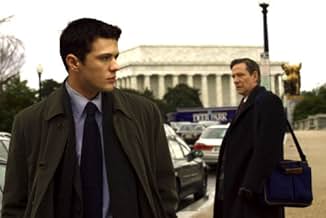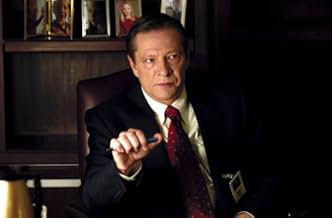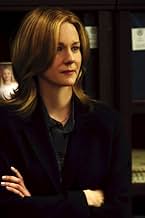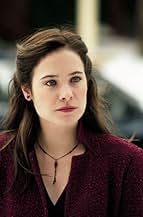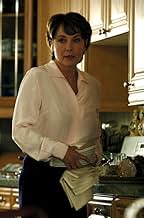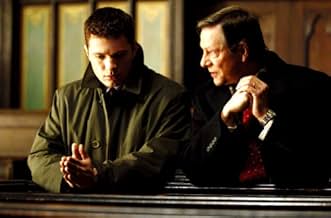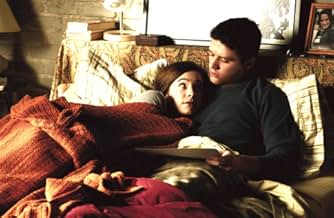एफबीआई अपस्टार्ट एरिक ओ''नील अपने बॉस, रॉबर्ट हंससेन, एक एजेंट के साथ एक पावर गेम में प्रवेश करता है।एफबीआई अपस्टार्ट एरिक ओ''नील अपने बॉस, रॉबर्ट हंससेन, एक एजेंट के साथ एक पावर गेम में प्रवेश करता है।एफबीआई अपस्टार्ट एरिक ओ''नील अपने बॉस, रॉबर्ट हंससेन, एक एजेंट के साथ एक पावर गेम में प्रवेश करता है।
- पुरस्कार
- 1 जीत और कुल 3 नामांकन
- Agent Loper
- (as Courtenay Stevens)
फ़ीचर्ड समीक्षाएं
And there is a formulaic bit about damaging fathers and odd wives. More: there's the project command center that is drawn from movies and not from life. And finally, our hero is told the FBI's biggest secret in an open public place. This would never ever happen, and it is staged this way only to help the pacing of the thing in terms of stagecraft. And that DIA computer room, with the nice clean Cray-like machines, is from the same fantasy world as "Red October's" neon-lighted missile tubes.
But in spite of all this, it works. And especially compared to "The Departed," it works, simply, cleanly, deeply.
That's because the filmmaker decided early in the game that he was going to do what the Hong Kong "Infernal Affairs" did well and others copied: this business of actors playing characters who are actors. In this case, we have two such in the same boat.
We have a top information manager at the FBI working for the Russians and acting normal, even when leading the hunt for himself. We have the young under cover guy pretending to be simply a clerk. Each intuits the other is watching. The older man completely wins at the start, with the younger man eventually besting him in artifice. Its a calculation that the filmmaker makes, when deciding not to tell us why our young hero does what he does and where he gets the tools. In an ordinary story, that would hurt, but here it is a wise decision because such "explaining" would get in the way of the economy of the thing. And it is all about economic connection with us.
Its a bit counterintuitive that effective stories sometimes get better by lopping off story elements and information. But it is true. Some students of the Hanssen case believe that Hanssen's primary motive was to show his own importance (as a information security planner) by revealing holes in the system that he would have plugged. I wish this film would have worked with that a bit, because this notion of helping the system by hurting is system is both what the story could have been about and the means used to tell the story.
Still, a good one.
As a historical note, there's a reason folks from the FBI and CIA, even senior ones, can't wander into NSA computing facilities. Hanssen wasn't allowed, probably a good thing at the time. Opus Dei again.
Ted's Evaluation -- 3 of 3: Worth watching.
Perfect casting has Chris Cooper as the very odd Hanssen who has nearly 25 years with the bureau, many of which have been spent selling off national secrets to the Soviet Union. In an almost unbelievable stroke of luck, Hanssen was put in charge of finding the mole ... yes, his job was to find himself!! Cooper is very strong here as the ego-maniacal tortured soul who pulls off his deceit with a disarming devotion to religion, the bureau and blending. He appears to be just another working stiff pulling in a paycheck.
Most of the supporting staff is solid. Laura Linney is slightly miscast as the agent in charge of bringing Hanssen down. Dennis Haysbert is her boss. Gary Cole plays it straight here, and Kathleen Quinlan (as Hanssen's wife) and Bruce Davison (as Eric O'Neill's dad) have brief but effective turns. Caroline Dhavernas is an actress I am not familiar with, but her performance here has me intrigued.
The weak link in the film is Ryan Phillipe, who just doesn't possess the acting chops to pull off the pivotal role of Eric O'Neill - the agent wannabe who gets thrust into the crucial position of bringing Hanssen down. It is just implausible to believe Phillipe could ever pass the FBI entrance exam, much less outsmart the guy who outsmarted the entire bureau for two decades. Despite the weakness, the story is strong enough to overcome this and maintain the quasi-thriller feel. This is quite an accomplishment for a film when all the viewers know how it will end!! The real life Hanssen is spending life in prison and O'Neill immediately resigned from the bureau for the "normal" life of a Washington attorney. Part spy thriller, part history lesson, part psychoanalysis, "Breach" is very enjoyable despite the fact that we are provided no real answers as to WHY this man acted as he did. We are only led to believe that it wasn't the money, but instead the ego that drove his madness.
Based on a true story, so I'm not sure how much of the detail (or even sweep) is true or artistic license, this is a quite satisfying drama that surprised me by how much I liked it. I hadn't heard anything really about it before watching it and I assumed it would be the usual spy thriller a la The Recruit, with twisty plots, running with guns and shouting. Instead what I got was a much slower and quieter drama that takes as much from the characters as it does from the story itself. It is not an easy sell but it works because the delivery "gets" what is required. The sweep of the narrative is engaging but what makes it succeed is the way it builds the two central characters so they are both of value to the viewer. I didn't think that O'Neill was the main character so much as a required device to get the audience involved with Hanssen. This allows the complex character to be built up and, while never totally understood, I was left with conflicting emotions about him and his motivations for what he did.
I have not put that very well but with this in mind the performances are key. I'm not a big fan of Phillippe to say the least but here he does good restrained work. He is not brilliant but he does just what the film needs. What he seems to benefit from is a great turn from Cooper. Cooper plays all the conflicting parts of his character really well so that, while not making total sense, they convince as reality. It is a great performance and he does make the film. In smaller roles Linney, Cole Quinlan and Haysbert are nice finds that add a sense of quality to the film. Dhavernas didn't work that well for me and it was just as well that her character's involvement was minimal.
Breach is a grown-up spy film, not one for those looking for twisty narrative with a running and shouting conclusion. It delivers a satisfying story where we already know the ending and it does it by building the characters and relationships around the lead two to draw the viewer in. The performances from Cooper and Phillippe are worthy of the material as well, doing it justice and making it work.
"Breach" looks at the story through the eyes of Eric O'Neill, the young, up-and-coming junior agent assigned by investigators in the bureau to spy on Hanssen. In the position of personal assistant to Hanssen, O'Neill works to uncover evidence against his boss that will help to strengthen the legal case gradually being built against him.
"Breach" is a fairly solid political thriller, less concerned with big action scenes than with examining the relationship between these two very different men set in unwitting opposition to one another. Hanssen himself is a mass of immense hypocrisies and contradictions. A devout Catholic, he attends Mass religiously, recites the rosary everyday, and looks with disdain upon homosexuals, women who wear pants and anybody seemingly to the left politically of Rush Limbaugh and Ronald Reagan. Yet, despite his outward display of moral rectitude, Hanssen secretly distributes porn videos of his wife (she is unaware of their existence) and betrays his country by turning over classified information to the enemy. O'Neill finds himself simultaneously drawn to and repulsed by the man, who manages to be both prig and libertine at one and the same time. O'Neill knows that what Hanssen is doing is terribly wrong, yet he can't help falling under the spell of a man he knows that, under other circumstances, he might well come to value as a friend and a mentor.
Ryan Philippe is subtle and brooding as the taciturn O'Neill, reluctant to condemn the man he's been sent to bring down until all the facts are in. It's true that his performance is a bit of a Johnny-one-note at times, but since the function of the character is that of observer rather than catalyst, Philippe's self-effacing underplaying seems the right editorial choice here. Plus, it clears the deck for Chris Cooper to step to the forefront with his finely-tuned interpretation of Hanssen that brings real dimensionality and depth to the film. He turns Hanssen into a richly complex figure, a man who demands strict adherence to form yet who systematically violates that very rule at the deepest core of his own being. A stickler for protocol and standards and unforgiving of those who fall short of them, Hanssen somehow fails to see his own glaring weaknesses while managing to condemn others for theirs. Through his perceptive performance, Cooper makes it possible for us to see this walking paradox in all his complexity and humanity.
The movie itself, written by Adam Mazer, William Rotko and Billy Ray, and directed by Ray, is a trifle plodding at times and doesn't feel as vital as perhaps it should given the seriousness of the issues it is addressing, but, for the most part, we welcome its unfrenetic approach to the subject. It doesn't try to gin up the melodrama or unravel its human enigma - rather it presents him as truthfully and impartially as possible, then leaves it up to the viewer to render the final judgment.
क्या आपको पता है
- ट्रिवियाIn the hallway, we constantly see a poster with names and pictures of spies that have been caught, as well as short narratives of what their crimes were and how much time they're serving. These posters really exist in secure government facilities, and prominently displayed on all of them, since the events of this movie took place, is a photo of Robert Hanssen.
- गूफ़Eric and Robert enter a church and Eric makes the sign of the cross incorrectly, touching his shoulders before his sternum. Since much of the plot involves Eric's and Robert's Catholicism, it would have been an error that would have made Robert suspicious.
- भाव
Eric O'Neill: What if he's smarter than I am?
Kate Burroughs: A couple of years ago, the bureau put together a task force. Lots of assets had been disappearing. So this task force was formed to find the mole who was giving them up. Our best analysts poring over data for years looking for the guy, and they could never quite find him. Guess who was put in charge of the task force? He was smarter than all of us. Actually, I can live with that part. It's the idea that my entire career has been a waste of time, that's the part I hate. Everything I've done since I got to this office, everything we've all been paid to do, he was undoing it. We all coulda just stayed home.
- कनेक्शनFeatured in HBO First Look: Breach (2007)
- साउंडट्रैकNear You
Written by Francis Craig, Kermit Goell
Performed by The Andrews Sisters
Courtesy of Geffen Records
Under license from Universal Music Enterprises
टॉप पसंद
- How long is Breach?Alexa द्वारा संचालित
विवरण
- रिलीज़ की तारीख़
- कंट्री ऑफ़ ओरिजिन
- भाषाएं
- इस रूप में भी जाना जाता है
- Un enemigo en casa
- फ़िल्माने की जगहें
- उत्पादन कंपनियां
- IMDbPro पर और कंपनी क्रेडिट देखें
बॉक्स ऑफ़िस
- US और कनाडा में सकल
- $3,32,31,264
- US और कनाडा में पहले सप्ताह में कुल कमाई
- $1,05,04,990
- 18 फ़र॰ 2007
- दुनिया भर में सकल
- $4,09,53,935
- चलने की अवधि1 घंटा 50 मिनट
- रंग
- ध्वनि मिश्रण
- पक्ष अनुपात
- 1.85 : 1
इस पेज में योगदान दें








